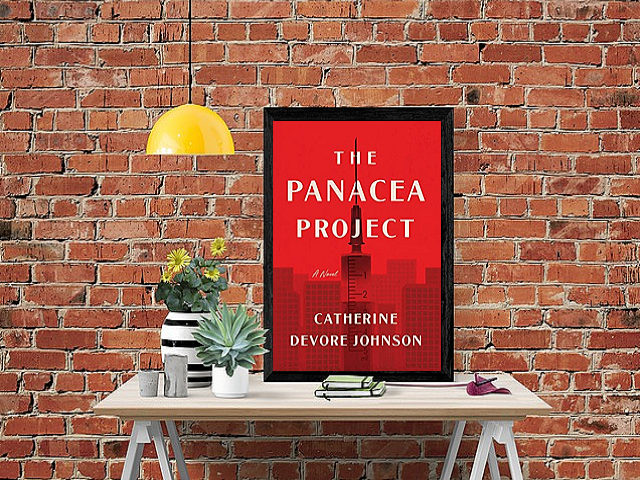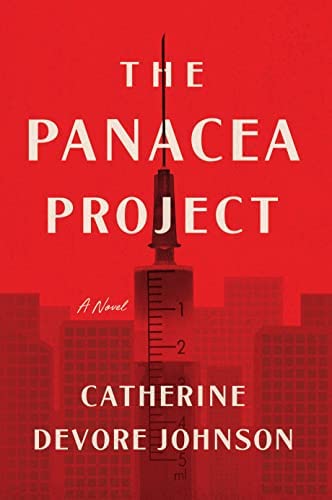Catherine Devore Johnson is a former attorney turned writer. Her work has won or placed in competitions held by the Houston Writer’s Guild and the Writer’s League of Texas, and she has published an essay in The Houston Chronicle about caring for her mother after two strokes. She works as a writer and editor at a children’s hospital and lives in Houston with her husband and two children. The Panacea Project is her first novel.
Website: https://www.cdjohnsonauthor.com/
Twitter: https://twitter.com/cdjohnsonauthor
Instagram: https://www.instagram.com/catherinedjohnsonauthor/
Thanks for stopping by! What attracted you to the medical thriller genre?
Thanks for having me! I didn’t necessarily set out to write a medical thriller, but as I began developing the plot of The Panacea Project, it became clear that I was heading in that direction. I’m a sucker for a good thriller, so it was a lot of fun to write a story in that space. That being said, because of the other
topics my book explores—bodily autonomy, friendship, romantic relationships—I believe it will also appeal more generally to fans of women’s fiction.
Do you write in any other genres?
Yes! I love exploring different ways of telling stories. My favorite books don’t fit neatly into a single genre and I like to reflect that in my own work. The book I’m currently developing feels like women’s fiction to me, but it will be interesting to see if it takes a turn toward a different genre as I get further down the road with it.
What inspired you to write The Panacea Project?
I struggled with hypochondria as a young adult, in particular a fixation that any ailment I was experiencing at a given moment was due to cancer. I also had (have) an overactive imagination, so at some point I began wondering if it might be possible for a person to develop cancer over and over again, only to have their immune system cure it. I filed the idea away in the back of my mind under “crazy notions I’ve cooked up to justify my health anxieties,” but it stuck. And quietly germinated.
In the meantime, my husband experienced a very real health emergency. Ten years ago this May, he was diagnosed with testicular cancer and had surgery to remove the tumor. The day I brought him home from the hospital, I learned that a friend from high school had been diagnosed with stage 4 gastric cancer and was in hospice. She died a few days later. The double whammy of her death and my husband’s diagnosis was devastating.
My only comfort during that very dark time was the news that my husband’s cancer was early-stage with no evidence of spread. His oncologist recommended strict surveillance (scans and blood work every few months), but no further treatment. Eighteen months later, though, the cancer recurred in an abdominal lymph node. My husband underwent proton radiation therapy and has been cancer-free since his last round of treatment. We were incredibly lucky. The cancer was detected early, it was highly treatable, and we had access to some of the best medical care in the United States. But the experience was still harrowing and it made a deep impression on me.
I’m sure it won’t come as much of a surprise to learn that all of this prompted my “crazy notion” about immune systems and cancer to poke out its head and demand that I give it some attention. I think I needed to write a story about cancer to help me process the pain and loss we had experienced. It wasn’t long before Calla’s story began to take shape in my mind and on the page.
Can you give us your book blurb so others can find out what your book is about?
Calla Hammond has always been a loner—a product of the foster system and avoided by others because of a skin condition. When doctors discover her immune system holds the key to curing cancer, she struggles to advance lifesaving research in a world that sees her only as a means to an end. Yet along the way, Calla gains the one thing she has always longed for: a chosen family.
When a group of unscrupulous people join forces to sell Calla’s blood to the highest bidder, she digs deep to find the strength to retake control of her life, her body, and her story.
The Panacea Project is a layered examination of self-sacrifice, implicit bias, and the juxtaposition of bodily autonomy with high-stakes capitalism. And a story for those who love fiercely strong characters and deep themes infused with heartwarming moments of love and humor.
How can readers discover more about you and your work?
Readers can visit my website at www.cdjohnsonauthor.com or follow me on Twitter at @cdjohnsonauthor, Instagram at @catherinedjohnsonauthor, and Facebook at cdjohnsonauthor.
Where can readers buy your book?
Amazon: https://www.amazon.com/Panacea-Project-Catherine-Devore-Johnson/dp/B0B1W3XN58
Barnes and Noble: https://www.barnesandnoble.com/w/the-panacea-project-catherine-devore-johnson/1141690016
Target: https://www.target.com/p/the-panacea-project-by-catherine-devore-johnson-hardcover/-/A-87566352
Books-A-Million: https://www.booksamillion.com/search?filter=&id=8741926250167&query=the+panacea+project
Bookshop.org: https://bookshop.org/p/books/the-panacea-project-catherine-devore-johnson/18619602?ean=9798886450156
Audible: https://www.audible.com/pd/The-Panacea-Project-Audiobook/B0BS8CV4HK
Thank you very much for taking the time out of your busy schedule to take part in this interview. What’s next for you?
It’s been a true pleasure. In addition to preparing for my book launch, I’m working on an essay that explores my experience as a member of the “sandwich generation.” Five years ago, my mother had two strokes in a week. She eventually recovered enough function to live on her own in a retirement community near my home, but she no longer drives and relies on me for a lot of assistance. My husband and I are also raising two teenagers, so it's a busy time and I’ve learned a lot about balancing my roles as a caretaker, a parent, a spouse, and an individual with aspirations of my own. And as I mentioned earlier, I’m in the early stages of developing my next book, a story about a woman who dies under strange circumstances and is forced to navigate a bureaucratic afterlife that doesn’t recognize her as living or dead.







